Trending topics: Ecology without colonialism
Five new postcolonial perspectives on living faithfully through climate change
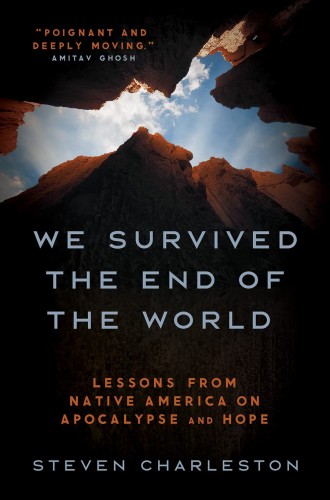
We Survived the End of the World
Lessons from Native America on Apocalypse and Hope
We Survived the End of the World: Lessons from Native America on Apocalypse and Hope
By Steven Charleston
Broadleaf Books
For those who, like me, live with the constant underlying fear of a climate apocalypse, Steven Charleston offers wisdom and a measure of hope. An Episcopal bishop and Choctaw elder, Charleston is widely known for the daily spiritual reflections he posts on Facebook, which resulted in his books Spirit Wheel and Ladder to the Light. In his latest book, Charleston speaks directly to readers experiencing climate despair. With the depth of a scholar and in the voice of a pastor, he presents the stories of four Native Americans who survived a level of environmental destruction and forced displacement that was nothing less than apocalyptic in scope. These forebears, who drew on spiritual traditions as they “sang and danced their way through the apocalypse, physically moving from one reality to the next,” are more than exemplars. They are revelations—which, Charleston reminds us, is another meaning of apocalypse.
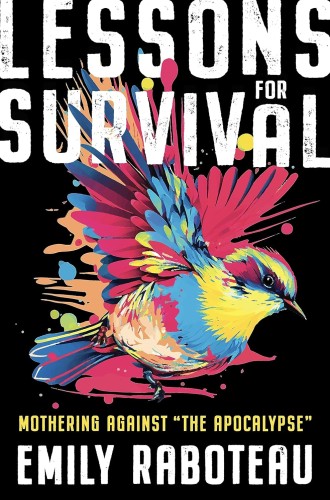
Lessons for Survival
Mothering Against “the Apocalypse”
Lessons for Survival: Mothering against “the Apocalypse”
By Emily Raboteau
Henry Holt
These beautifully wrenching essays quilt together Emily Raboteau’s reflections on living and parenting in New York City while watching one ecological crisis after another afflict various corners of the world. At the pinnacle of Lessons for Survival is a gorgeous essay called “Gutbucket,” first published in Orion magazine, in which Raboteau braids together her grief over the death of her father (Black religious studies scholar Albert Raboteau Jr.), insights from his groundbreaking research on slave religion, and her recent trip to Alakanuk, Alaska, to gather the testimony of Yup’ik elders on how their community is contending with the effects of climate change. Raboteau’s essays are punctuated by her photographs of the birds painted by local artists on doors and buildings across the city as part of the Audubon Mural Project. For Raboteau, mothering “against the apocalypse” involves the deliberate, daily practice of keeping your heart and mind open to the wisdom of artists, ancestors, neighbors, strangers, writers, children, storytellers, elders, and more.
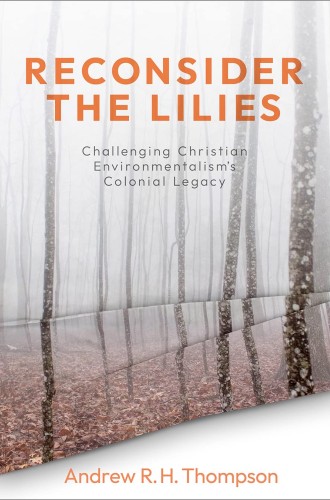
Reconsider the Lilies
Challenging Christian Environmentalism’s Colonial Legacy
Reconsider the Lilies: Challenging Christian Environmentalism’s Colonial Legacy
By Andrew R. H. Thompson
Fortress
In this lively monograph, theological ethicist Andrew Thompson draws on the work of non-White scholars (including the theology of Willie James Jennings, the ethics of Traci West, the decolonial praxis of Gloria Anzaldúa, and the relational anthropology of Mayra Rivera) to show how eco-theology relies on the same structures of Whiteness that create the need for it. “Green Christianity is white,” Thompson avers, and Christian environmentalism’s failure to see how it is intertwined with colonialism, racism, and supersessionism has led to devastating consequences. If your congregation is installing solar panels or planting native prairie species while failing to notice how many Black children across town are getting sick from their drinking water, you have an epistemological problem. Thompson hints at a new way of thinking about the interconnectedness of Christian faith and environmental praxis—one that embraces the transgression of boundaries, attends to desire, and looks to the incarnation.
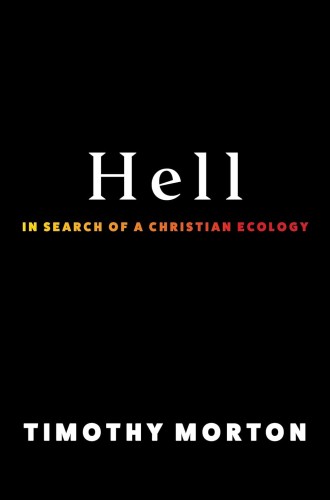
Hell
In Search of a Christian Ecology
Hell: In Search of a Christian Ecology
By Timothy Morton
Columbia University Press
It’s hard to describe exactly what this book is about, and I suspect that’s intentional. After all, says Timothy Morton, Christianity has long known exactly what it is about, bound as it is to the logic of “the age that ended up developing industrial capitalism and fossil fuels” by propagating a master-slave mentality along the lines of race, gender, and economic class (among other dualities)—and this logic has made the earth a living hell. Riffing off of William Blake’s The Marriage of Heaven and Hell in prose that often feels manic, Morton creates something that feels both greater and more obscure than the sum of its parts. (Those parts include takedowns of Blake’s “Nobodaddy” God, laments about the earth’s rapid warming, hints of the harrowing abuse Morton suffered as a child, musings about epistemology, an explanation of Trump’s success, observations on Shakespeare and the Song of Songs and Elon Musk, challenges to Gnosticism and its legacies, wry jokes, plenty of profanities, and a splash of good old-fashioned Christian hope.) Hell cultivates an experience more than it lays out an argument, as if to chip away at the certainties that have long held Christians captive to the colonialist and capitalist structures that have brought hell into the present. This book is maddening, and therein lies its brilliance.
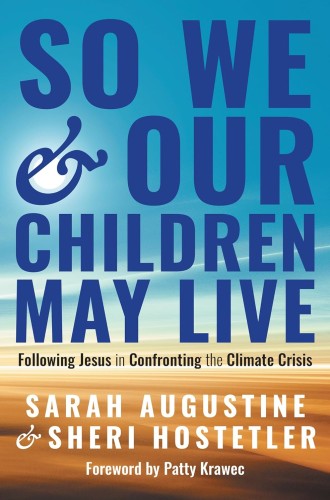
So We and Our Children May Live
Following Jesus in Confronting the Climate Crisis
So We and Our Children May Live: Following Jesus in Confronting the Climate Crisis
By Sarah Augustine and Sheri Hostetler
Herald Press
If I had a captive audience of American Christians who agreed to read whatever book I suggested and discuss it together, there is no question that I’d choose this book. Mennonites Sarah Augustine, who is of Pueblo (Tewa) descent, and Sheri Hostetler bring together personal experience, science, biblical exegesis, economic analysis, theology, cultural theory, and Indigenous cosmology to chart a way through the challenges the earth currently faces. Their prose is gentle but incisive. Their main point: decarbonization is not enough to save us from the damage wrought by an extractive culture aimed at perpetual economic growth. We need to decolonize our ways of thinking, knowing, acting, and prioritizing—which involves taking in Indigenous knowledge, resisting colonial institutions, working for tangible results, and accepting the discomfort of conflict. The grace revealed in this book is also a challenge that calls readers to action: “We are joined to each other in a closed system of mutual dependence.”





